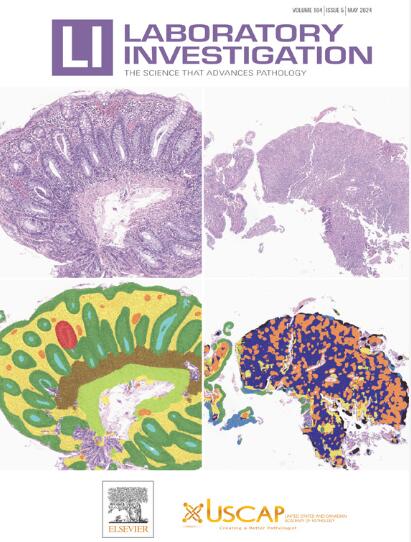Role of the Crosstalk B:Neoplastic T Follicular Helper Cells in the Pathobiology of Nodal T Follicular Helper Cell Lymphomas
IF 5.1
2区 医学
Q1 MEDICINE, RESEARCH & EXPERIMENTAL
引用次数: 0
Abstract
Angioimmunoblastic T-cell lymphoma (AITL), the most common form of peripheral T-cell lymphoma, originates from follicular helper T (Tfh) cells and is notably resistant to current treatments. The disease progression and maintenance, at least in early stages, are driven by a complex interplay between neoplastic Tfh and clusters of B-cells within the tumor microenvironment, mirroring the functional crosstalk observed inside germinal centers. This interaction is further complicated by recurrent mutations, such as TET2 and DNMT3A, which are present in both Tfh cells and B-cells. These findings suggest that the symbiotic relationship between these 2 cell types could represent a therapeutic vulnerability. This review examines the key components and signaling mechanisms involved in the synapses between B-cells and Tfh cells, emphasizing their significant role in the pathobiology of AITL and potential as therapeutic targets.
B:肿瘤性T滤泡辅助细胞(TFH)串联在结节性TFH细胞淋巴瘤病理生物学中的作用。
血管免疫母细胞T细胞淋巴瘤(AITL)是外周T细胞淋巴瘤中最常见的一种,起源于滤泡辅助T细胞(Tfh),对目前的治疗具有明显的抗药性。至少在早期阶段,疾病的发展和维持是由肿瘤微环境中的肿瘤Tfh和B细胞群之间复杂的相互作用所驱动的,这反映了在生殖中心内观察到的功能性串扰。Tfh细胞和B细胞都存在的TET2和DNMT3A等复发性突变使这种相互作用变得更加复杂。这些发现表明,这两种细胞类型之间的共生关系可能代表着一种治疗漏洞。本综述探讨了 B 细胞和 Tfh 细胞之间突触所涉及的关键成分和信号转导机制,强调了它们在 AITL 病理生物学中的重要作用以及作为治疗靶点的潜力。
本文章由计算机程序翻译,如有差异,请以英文原文为准。
求助全文
约1分钟内获得全文
求助全文
来源期刊

Laboratory Investigation
医学-病理学
CiteScore
8.30
自引率
0.00%
发文量
125
审稿时长
2 months
期刊介绍:
Laboratory Investigation is an international journal owned by the United States and Canadian Academy of Pathology. Laboratory Investigation offers prompt publication of high-quality original research in all biomedical disciplines relating to the understanding of human disease and the application of new methods to the diagnosis of disease. Both human and experimental studies are welcome.
 求助内容:
求助内容: 应助结果提醒方式:
应助结果提醒方式:


